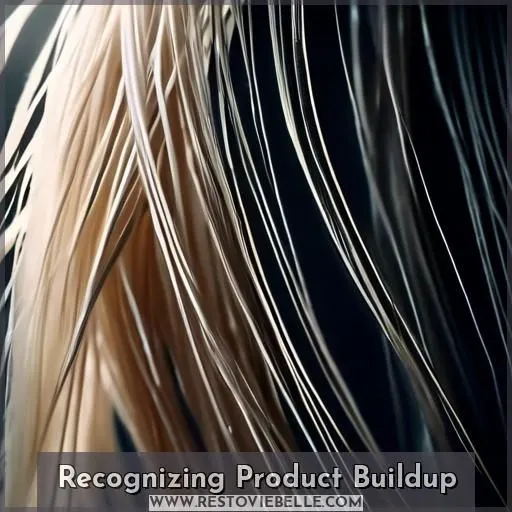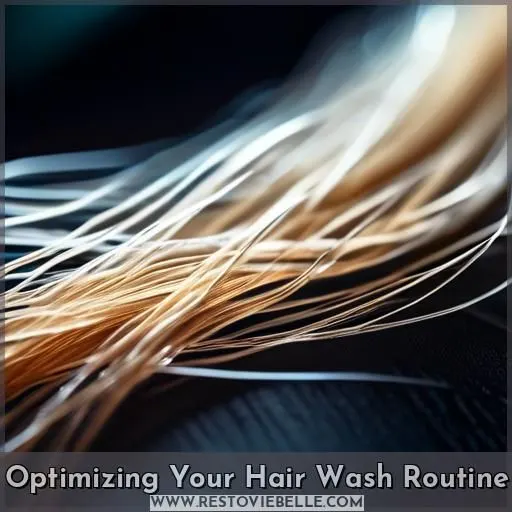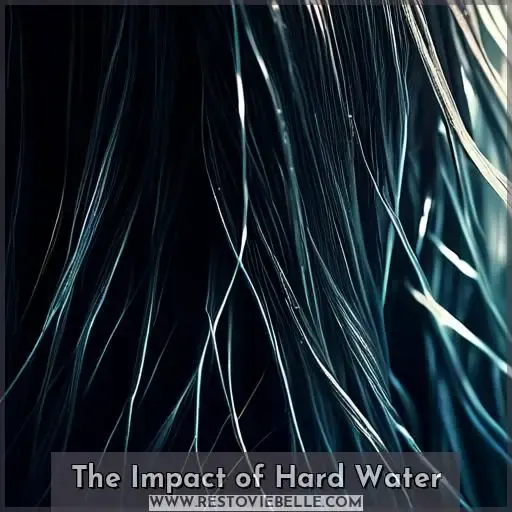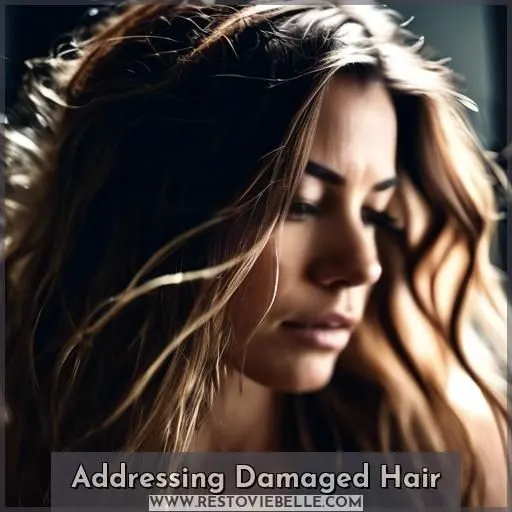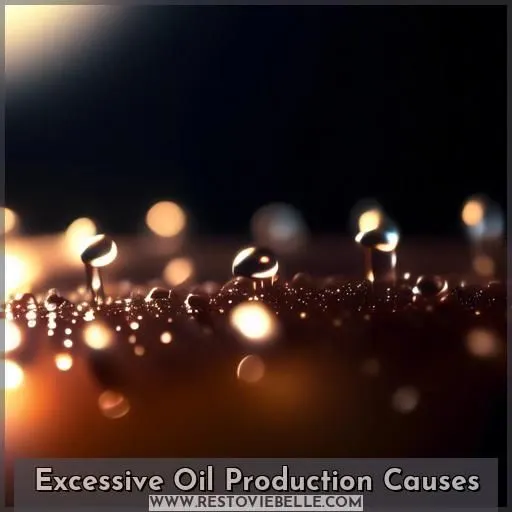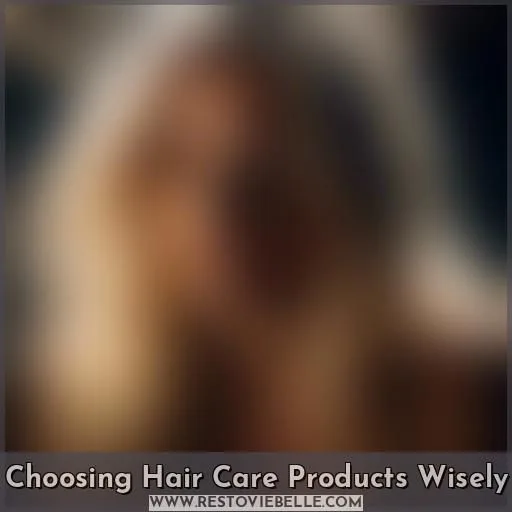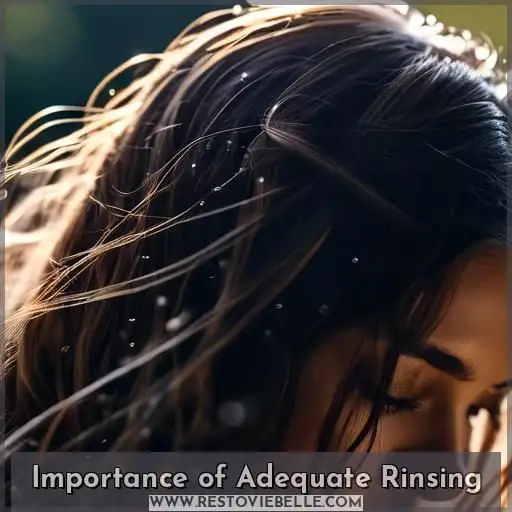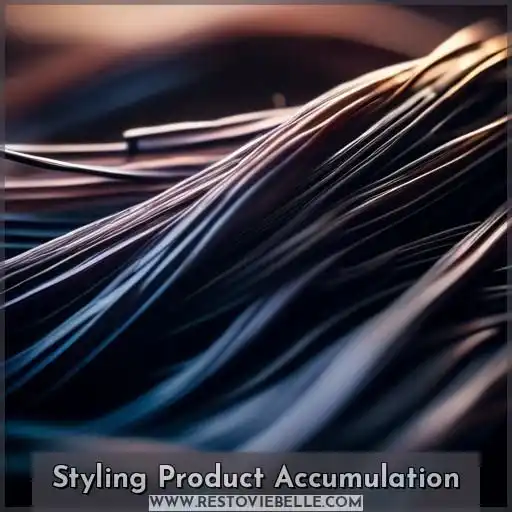This site is supported by our readers. We may earn a commission, at no cost to you, if you purchase through links.
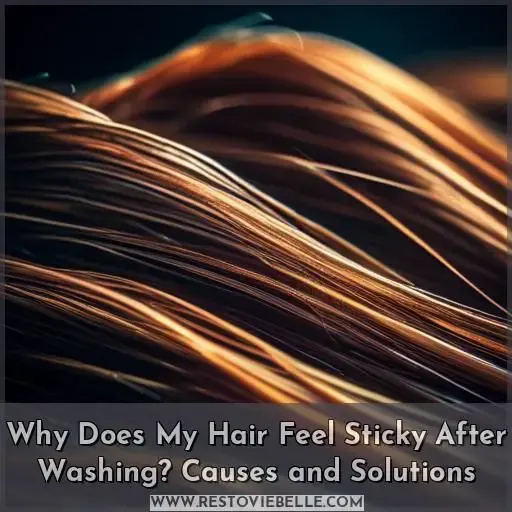
Your hair feels sticky after washing likely due to product buildup, hard water residue, or excessive oil production.
Heavy silicones, waxes, and oils in hair products can leave a waxy coating.
Hard water minerals like calcium also create a sticky film.
Medical conditions or medications affecting hormones or oil glands contribute too.
Avoid over-conditioning and washing infrequently.
Use clarifying shampoos and rinse thoroughly to remove residues.
You’ll discover more potential causes and remedies for sticky hair ahead.
Table Of Contents
- Key Takeaways
- Why Does My Hair Feel Sticky After Washing?
- Recognizing Product Buildup
- Optimizing Your Hair Wash Routine
- The Impact of Hard Water
- Addressing Damaged Hair
- Health and Medication Influences
- Excessive Oil Production Causes
- Choosing Hair Care Products Wisely
- Importance of Adequate Rinsing
- Styling Product Accumulation
- Conclusion
Key Takeaways
- Product buildup, hard water residue, or excessive oil production can cause sticky hair after washing.
- Clarifying shampoos and rinsing hair thoroughly can help remove residues.
- Over-conditioning and washing hair infrequently should be avoided.
- Hard water minerals can leave a sticky film on hair, and water softeners can help reduce this.
Why Does My Hair Feel Sticky After Washing?
Your hair may feel sticky after washing due to several reasons.
Using the wrong shampoo and conditioner for your hair type.
Shampooing your hair too frequently.
Washing your hair with hard water.
Not rinsing your hair properly.
Using excessive hair products.
To solve this issue, consider the following.
Finding the right shampoo and conditioner for your hair type.
Washing your hair less frequently.
Using a water filter to soften hard water.
Rinsing your hair thoroughly.
Reducing the use of hair products.
Recognizing Product Buildup
Ever felt like you’re donning a waxy helmet after a wash?
Chances are, it’s product buildup.
To dodge this sticky fiasco, think light.
Opt for water-based products and sidestep the heavy stuff like silicone.
Less is more, so apply sparingly.
If your tresses are rebelling, a clarifying shampoo can play the hero, stripping away the grime.
Or, go old-school with an apple cider vinegar rinse.
Optimizing Your Hair Wash Routine
Before shampooing, soak your hair in water to help prepare it for cleansing and prevent the shampoo from drying out your strands. When conditioning, focus the product primarily on the mid-lengths and ends of your hair, as these areas tend to be drier and more prone to damage compared to the roots.
Soaking Before Shampooing
To guarantee your hair feels soft and manageable after washing, it’s essential to saturate your hair in water before using shampoo.
This step permits the hair cuticle to relax, enhancing shampoo absorption and facilitating the removal of dirt and product buildup.
Additionally, rinsing your hair completely after shampooing is vital to remove all product residue, which can contribute to waxy or sticky hair.
By following these steps, you can maintain healthy, vibrant hair and avoid the buildup that leads to a sticky, waxy feeling.
Focusing Conditioner on Ends
Focusing conditioner on your ends is essential for a healthy hair wash routine.
In conditioners, leave-ins, hair masks, dry shampoo, and overnight oil treatments, make sure that the majority of the product reaches your ends.
This is where your hair is most damaged and prone to breakage.
By applying conditioner to your ends, you can help restore moisture, prevent waxy buildup, and keep your hair smooth and manageable.
However, avoid using too much product, as this can lead to sticky hair.
If you have endocrine disorders or use clarifying shampoo, consider using a gentle, lightweight conditioner to prevent excess waxy buildup.
The Impact of Hard Water
Hard water contains high levels of dissolved minerals like calcium and magnesium. These minerals can leave a sticky, waxy residue on your hair that makes it feel unclean and heavy even after washing.
Mineral Residue on Hair
Hard water contains high levels of minerals like calcium and magnesium, which can leave a sticky, waxy residue on your hair.
This residue can make your hair feel oily, even after washing.
To remove mineral buildup, consider using a water-based shampoo and rinse your hair thoroughly.
Additionally, you may want to use a scalp therapy or clarifying gel to help remove any residue.
If the problem persists, it may be worth installing a water softener shower head to reduce the impact of hard water on your hair.
Installing a Water Softener
Hard water, which contains high levels of minerals like calcium and magnesium, can leave a sticky, waxy residue on your hair.
This residue can make your hair appear dull, dry, and difficult to manage.
To combat this issue, consider installing a water softener shower head.
Water softeners work by exchanging the positively charged calcium and magnesium ions with sodium or salt, effectively removing the minerals that cause the buildup.
This can lead to softer, more manageable hair, as well as reduced issues like dandruff and scalp irritation.
Addressing Damaged Hair
You may notice your hair feeling sticky after washing if it has sustained damage from chemical processing or excessive heat styling. Damaged hair cuticles can cause strands to appear dull, waxy, or coated—a telltale sign that you should avoid further bleaching, coloring, or heat treatments, and routinely wash any hair accessories that may accumulate product buildup.
Avoiding Chemical and Heat Damage
When your hair feels like a sticky mess, it’s time to turn down the heat and give harsh chemicals the cold shoulder. Here’s how:
- Protein Treatments: Reinforce your strands with protein-packed potions to repair cuticle carnage.
- Deep Conditioning: Immerse yourself in moisture-rich deep conditioners to quench your hair’s thirst.
- Scalp Treatments: Embrace scalp soothers to maintain a healthy foundation for growth.
Washing Hair Accessories
Washing hair accessories like hats and scarves can lead to product buildup, making your hair feel sticky. To prevent this, wash your hairbrushes and other accessories regularly. If you’re using Batiste dry shampoo, remember to shake it well before use and apply it sparingly. For volume shampoo, apply it evenly to your scalp and rinse thoroughly.
Health and Medication Influences
Hormonal imbalances and certain medications can contribute to sticky, waxy hair buildup. Conditions like pregnancy, thyroid disorders, or medications such as steroids, blood thinners, and birth control pills can disrupt your body’s natural oil production, leading to excessive sebum secretion from your scalp.
Hormonal Imbalances
Hormonal imbalances can contribute to a waxy texture in your hair, making it feel greasy and sticky.
This is often due to an overproduction of sebum, the natural oil produced by your scalp, which can lead to a buildup of residue on your hair strands.
Thyroid dysfunction can also cause dryness or excessive oiliness in the scalp, leading to waxy hair.
Additionally, hormonal changes during puberty or menopause can impact the texture of your hair, causing it to feel waxy at certain times.
If you suspect a hormonal imbalance may be causing your waxy hair, it’s crucial to consult with a healthcare professional who specializes in endocrinology or dermatology.
They can help identify any underlying conditions causing these imbalances and develop a treatment plan designed specifically for your needs.
Medication Side Effects
Medications like blood thinners, birth control, and steroids can impact your hair’s health, leading to a sticky or waxy feeling. These drugs can increase oil production, causing buildup on your hair. To combat this, consider using an anti-oxidant shampoo to help balance oil production and maintain healthy hair.
Excessive Oil Production Causes
You may be washing your hair too frequently, which can strip away protective oils and trigger excess oil production from your scalp as a compensatory measure. Additionally, a diet high in fatty, sugary, or stimulating foods can contribute to increased sebum secretion, leading to an excessively oily scalp and potentially sticky hair.
Washing Frequency
Your hair texture and product quality play a significant role in how often you should wash your hair.
Fine-textured hair may require more frequent washing, while coarser hair can go longer between washes.
Focus on your rinsing technique and conditioning routine to avoid excessive oiliness.
Washing your hair too frequently, especially with low-quality shampoo, can lead to product buildup and stickiness.
Incorporate an antioxidant shampoo into your routine to help maintain a healthy scalp and hair.
Diet Impact
Just as over-washing can leave your locks lackluster, your diet might be greasing the wheels for that sticky feeling.
Indulging in fatty foods, sugary snacks, and stimulating foods like caffeine can turn your scalp into an oil slick.
Nutrition plays a backstage role in hair health.
So, if you’re aiming for the spotlight with luscious locks, consider tuning your diet to cut the grease and amp up the glam.
Choosing Hair Care Products Wisely
You’ll want to avoid hair care products that contain heavy ingredients like silicones, petroleum, heavy oils, and waxes. These can lead to buildup on your strands and contribute to that sticky, waxy feeling after washing.
Additionally, be cautious of products that contain high amounts of silicone oils. These can leave a residue on your hair that’s difficult to remove, leading to buildup over time.
Avoiding Heavy Ingredients
To avoid heavy ingredients, opt for water-based products. Apply sparingly to avoid buildup. Natural hair oils can cling to hair, so exfoliate your scalp regularly. Clarifying shampoos can help remove buildup. Use them once a week.
Silicone Oil Buildup
Silicone oil buildup can be a major cause of sticky hair after washing.
To prevent this, avoid water-resistant ingredients like silicone and polymer, which cling to hair and cause buildup.
Instead, opt for water-based products and apply them sparingly.
If you’re already experiencing buildup, consider using home remedies like apple cider vinegar or lemon juice to help remove excess product.
Ingredient awareness is key to maintaining healthy, non-sticky hair.
Importance of Adequate Rinsing
Proper rinsing is essential for maintaining healthy, clean hair. Insufficient rinsing can result in product accumulation, which can make your hair feel tacky and coated. Here are some guidelines for effective rinsing techniques:
- Thoroughly rinse conditioner prior to shampooing.
- Concentrate on rinsing the scalp and mid-lengths to eliminate conditioner remnants.
- Utilize lukewarm water for rinsing to preserve scalp circulation.
- Untangle hair before rinsing to prevent breakage.
- Rinse hair thoroughly after shampooing to remove all product residue.
Styling Product Accumulation
Styling products are a common culprit for sticky hair after washing.
Hairspray, in particular, can leave a thick, sticky residue that builds up over time.
To avoid this, choose products with water-based ingredients and avoid those with heavy, thickening agents.
Additionally, be sure to rinse your hair thoroughly after using styling products, as residue can accumulate and cause buildup.
Regularly cleaning your hairbrushes and other accessories can also help prevent the transfer of product buildup to your hair.
Conclusion
Ironically, having sticky hair after washing often stems from improper cleansing.
By understanding why your hair feels sticky after washing – whether from product buildup, hard water minerals, or excessive oil – you can adjust your routine accordingly.
Clarify strands with periodic deep cleanses.
Use lightweight formulas customized to your needs.
Maintain balanced scalp health for ideal hair texture.

